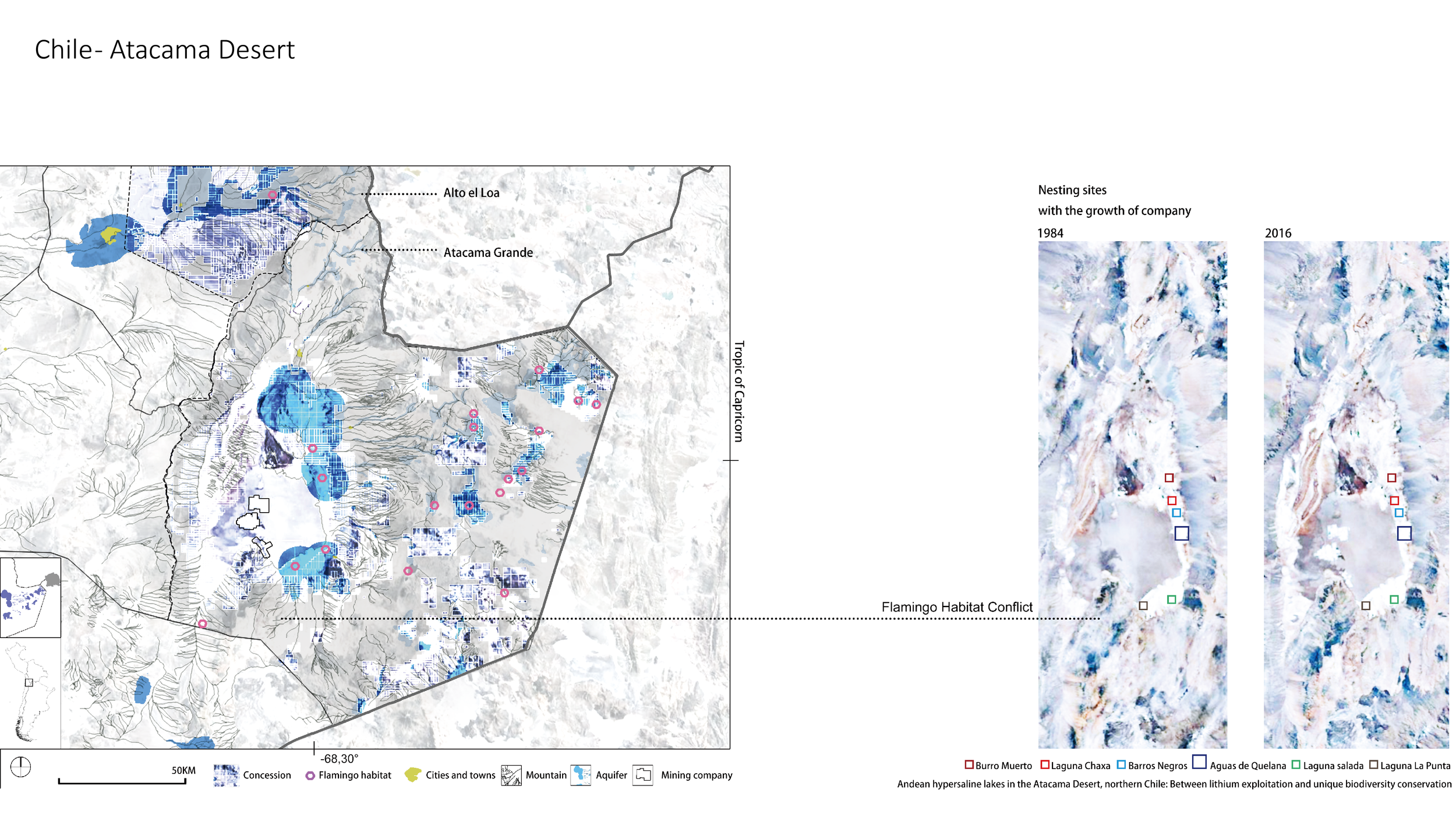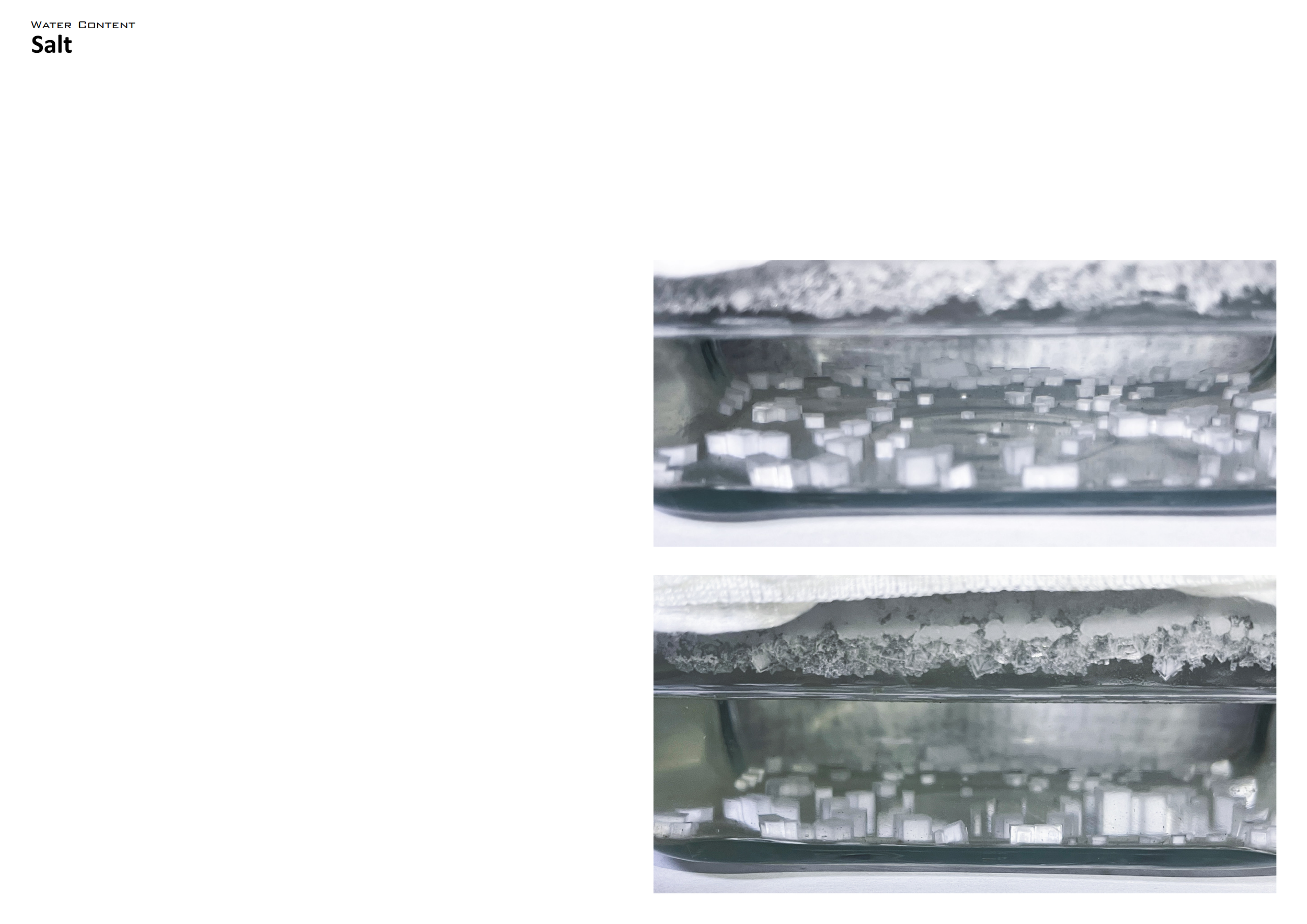The decline in the flamingo population is linked to lithium mining which disrupted lagoon ecosystems, causing ecological imbalances. This resulted in diminished food sources, duller feathers, and mating challenges for flamingos. Chilean laws prioritize mining over indigenous rights to clean water, reflecting a form of new colonialism that values Western science over indigenous voices.
Linking Technology and Landscape
Oct 29, 2023
Connetion : +3234
Shares : 3214
At first, no one knew why the flamingo population began to decline slowly, only to complain that there weren't enough flamingo eggs for breakfast. In Yue Yu’s research, it was found that an imbalance in the lagoons' ecosystem was the cause. The mining of lithium resources destroyed the salinity of the original water system, algae began to bloom, and an ecological imbalance occurred. Eventually, the environmental imbalance led to a small-scale species extinction that made it inevitable that the flamingos would lose their food, their feathers would no longer be bright, and they would have difficulty attracting mates and go extinct. But where does the salt in the water come from - no one knows the exact answer.
The flamingo reality claim is a spiritual issue, and it is called structural violence or slow violence. Chilean law defines brine as a mineral resource and not a water resource. In this covert way, the law turns indigenous people's "right to clean air and pure water" into "the ability of the inhabitants to buy minerals".
It is worth noting that the voices of indigenous people are ignored, whether simple data represent the environment or whether environmental impacts are measured solely by Western science. Such a system of knowledge is a new form of colonialism. Whether it is the silent alteration of a natural ecology or a broken culture, it is driven by the epistemologies of the North, which are "based on the negation of the inhabitants and knowledge of the territories that are subjected to colonization and exploitation" (de Sousa Santos 2019).
起初,沒有人知道為什麼火烈鳥的數量開始慢慢減少,只是抱怨沒有足夠的火烈鳥蛋來做早餐。 在 Yue Yu 的研究中,發現潟湖生態系的不平衡是原因所在。 鋰資源的開採破壞了原有水系統的鹽度,藻類開始大量繁殖,生態失衡。 最終,生態失衡導致了小規模的物種滅絕,使火烈鳥不可避免地失去了食物,羽毛不再鮮豔,難以吸引配偶而滅絕。 但是,水中的鹽從何而來--沒有人知道確切的答案。
事實上,火烈鳥的現實主張既不是政治問題,也不是經濟或社會問題。 在 Yue Yu 看來,它是一個精神問題,它被稱為結構性暴力,或緩慢的暴力。 智利的法律將鹵水定義為礦產資源,而不是水資源。 透過這種隱藏的方式,法律將原住民的 "清潔空氣和純淨水的權利 "變成了 "居民購買礦物的能力"。
值得注意的是,不管是用簡單的數據來表示環境,還是只用西方科學來衡量環境影響,原住民的聲音都被忽略了。 這樣的知識體係是一種新形式的殖民主義。 無論是對自然生態的無聲改變,還是對破碎文化的無聲改變,都是由北方認識論推動的, "基於對遭受殖民化和剝削的領土的居民和知識的否定"(de Sousa Santos 2019)。
Yue Yu
Hailing from China's vast Hulunbuir Grassland, Yue Yu ardently explores the intricate relationships between humans and their environment. With an honours degree in human geography, she has actively engaged in conservation projects like "Protect Chinese Pallas' Cat", "Let Migratory Birds Fly", and "Panda Husbandry Learner".
At the Royal College of Art, Yue delved deep into climate change, the aesthetics of decolonization, and the impacts of lithium extraction. Her master's thesis, "Environmental Reality Claims: Linking Technology and Landscape", scrutinizes the dangers of oversimplifying environmental protection, highlighting the detachment it creates between humans and nature and challenging mining company SQM's ecological assertions.
來自中國廣闊的呼倫貝爾草原的 Yue Yu,熱切地探索人與環境之間的錯綜複雜的關係。 她以榮譽學位畢業於人文地理學,並積極參與如"保護中國兔猻"、"讓候鳥飛翔"和"熊貓飼養學習者"等自然保護計畫。
在皇家藝術學院,Yue Yu 深入探討了氣候變遷、去殖民化的美學和鋰提取的影響。 她的碩士論文"環境現實主張:連結技術與景觀",深入審查了過於簡化環境保護的危險性,強調它在人與自然之間創造的脫節,同時也挑戰了礦業公司SQM的環境聲明。
Yue Yu @yu.y.24
School of Architecture
Environmental Architecture (MA)
250271@network.rca.ac.uk














